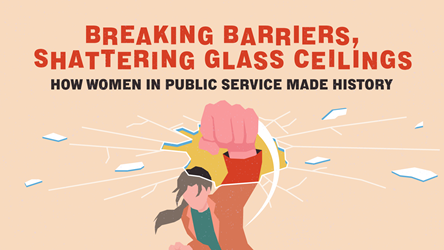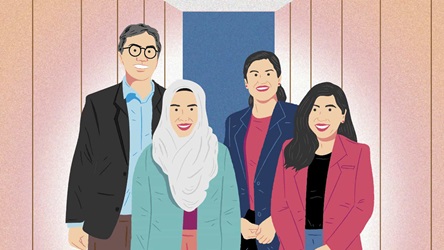Working Under Siege To Bring Singaporeans To Safety
.jpg)
After 10 pm on July 15, 2016, Mr A Selverajah, Singapore’s Ambassador to the Republic of Turkey, was just putting his feet up and relaxing in his apartment in Ankara when the phone rang.
It was his First Secretary, Mr Jeremy Low. “Ambassador,” he said, “it appears there’s been a coup attempt.”
The ambassador quickly turned on the television. Watching the news, he suddenly heard supersonic booms and looked out of the window. F-16 jets were tearing through the sky as helicopters whirred overhead.
This would be the bloodiest coup attempt in Turkey’s modern history. Part of the military had launched a coordinated operation in several major cities to topple the government and unseat President Recep Tayyip Erdoğan.
With nearly 40 years at the MFA, Mr Selverajah knew from past briefings what to do during a coup. But this was the first time he had ever been in an actual insurgency.
“The thoughts running through my head were, would the food supply be affected? Would we wake up to a new Turkey? Would there be a new government? But the first priority was to make sure that Singaporeans were safe,” he said.
There were about 35 Singaporean families in Istanbul and four families in Ankara. Many other Singaporeans – not all registered with the MFA – were stranded at airports in Istanbul and Antalya, hundreds of kilometres apart.
Other than the ambassador and Personal Assistant Dina Long, officers from the MFA Ankara Mission in Turkey were all on their first posting and relatively young. They didn’t sleep a wink that night.
Backdrop of terror
The coup wasn’t a complete bolt from the blue; 2016 had been a chaotic year of multiple terrorist attacks.
First Secretary (Political) Jeremy Low, 30, and Second Secretary (Administrative and Consular) Priscilla Chang, 29, had been based in Ankara for about a year then.
“We had several security incidents in Turkey before which gave us some experience in handling crisis situations,” they wrote in a joint e-mail to Challenge.
“However, the attempted coup was on an entirely different level. We could only remain level-headed and improvise as we went along. It helped that our colleagues in Singapore at MFA HQ supported us during that time.”
Per protocol, with the assistance of their MFA colleagues in Singapore, they called all 155 Singaporeans in Turkey who were registered with the MFA and sent messages to those who did not pick up. Their advice: stay indoors, monitor the local news and contact the Embassy or MFA HQ if they required urgent consular assistance.

Stranded
More pressing were the Singaporeans trapped at two of Turkey’s busiest airports. Airport staff had evacuated, providing no help or explanation to terrified passengers in a now-chaotic space.
Aided by the Singapore Airlines (SIA) station manager, Mr Lim Chuan Kai, the MFA quickly set up a gathering point for Singaporeans at the Istanbul airport. “Seeing other Singaporeans around was also a form of support and a source of comfort,” wrote Mr Low and Ms Chang.
The MFA officers in Ankara were similarly stuck in their own apartments. “The low-flying jets and chaos on the street made it very dangerous for anyone to attempt to leave their houses. Army tanks had blocked access to the airport. We could only keep in touch with the Singaporeans remotely,” said Mr Low and Ms Chang.
But not all Singaporean travellers had registered with the MFA, making it difficult to reach them. That night, about 60 Singaporeans called the MFA to say they were in Turkey and needed help.
The officers provided updates to their headquarters and assisted Singaporeans with searching for alternative flights and hotels for temporary accommodation.
“We maintained constant contact with Singaporeans to assure them that the Embassy was trying its best to secure flights out,” said Mr Low and Ms Chang.
At the Antalya airport, a group of 21 – eight adults and 13 children – were on their way from Singapore to Sweden for a football competition. They were stranded after their Turkish Airlines flight was diverted from Istanbul. The children were distraught and everyone was desperate to be on the first flight out of Turkey. Throughout the night, the officers assured them and made sure they were brought to a hotel to rest. When the group was flown back to Istanbul, the officers ensured the team had access to an airline lounge to rest. Together with the MFA HQ and partners at SIA, the officers were able to send the football team to Sweden, in time.
Worried, traumatised
By the time the coup was brought under control, the focus shifted to helping Singaporeans return home.
“After a night of uncertainty and turmoil, we understood that the Singaporeans were relying on us for emotional support.
“It was challenging to temper their expectations of what the Embassy could do,” the officers shared. The Embassy was unable to accede to their requests to charter flights or ships to escort them back home, secure seats on the next available flight, or bring forward the flight schedule to Singapore.
Many of the Singaporeans who called the Embassy were stressed, worried and traumatised.
“Some had voices that shook... A small number cried,” said Ms Chang. “For those who appeared traumatised, we kept in touch with them hourly to reassure them that we were there.”
The officers continued to explain that there was a backlog of planes waiting to depart and travellers had to wait patiently to have their flights rescheduled. They also sought help from the Turkish Airlines station manager in Singapore.
Finally, the officers got hold of the latest revised flight schedules and Singaporeans were gradually re-booked on flights.

Life goes on
The coup was over by the next morning. Thousands of ordinary citizens, galvanised via social media, gathered in the streets with nothing more than kitchen utensils to oppose the coup. Around 240 people lost their lives and more than 2,000 were injured.
Mr Low and Ms Chang recalled: “It was challenging to keep calm. We saw planes bombing buildings and helicopters opening fire not far from where we were.”
But what lingers in their minds is something else.
“Amidst the roar of the fighter jets and the explosions… we saw municipal workers clearing the rubbish on the streets as per normal. It was somewhat surreal but also a striking reminder of the resilience of the Turkish people,” said Mr Low. “The stoic spirit displayed by our Turkish friends is truly inspiring and worth emulating.”
- POSTED ON
Oct 7, 2017
- TEXT BY
Wong Sher Maine
- ILLUSTRATION BY
Mushroomhead









